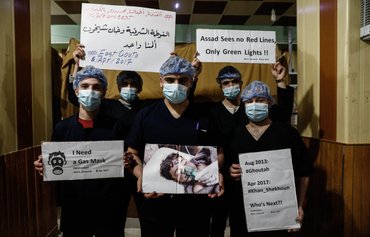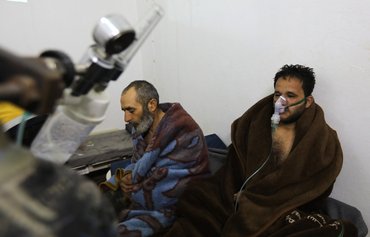THE HAGUE -- Member states of the global chemical weapons watchdog voted Wednesday (April 21) to strip Syria of its rights at the organisation after a probe blamed the Syrian regime for a series of poison gas attacks.
A motion backed by countries including France, Britain and the United States to suspend Syria's "rights and privileges" obtained the required two-thirds majority in the vote at the Organisation for the Prohibition of Chemical Weapons (OPCW).
The unprecedented sanctions on Syria, for its use of toxic arms and failure to declare its arsenal, is the OPCW's maximum available punishment and is the first time the organisation has used such measures.
The 193 member states of the OPCW weighed a French proposal to suspend Syria's "rights and privileges" at the body, including its ability to vote.
The regime of Syrian President Bashar al-Assad is accused of failing to answer key questions after an OPCW probe last year found it attacked a Hama province village with the nerve agent sarin and the toxic chemical chlorine in 2017.
Syria agreed in 2013 to join the OPCW and give up all chemical weapons, following a suspected sarin attack that killed 1,400 people in Eastern Ghouta.
But an OPCW investigation found last April that the Syrian air force was responsible for March 2017 sarin and chlorine bombings on the Hama village of Latamneh.
The regime then failed to comply with a 90-day deadline by the OPCW's governing body to declare the weapons used in the attacks and reveal its remaining stocks.
France in response submitted a motion backed by 46 countries calling for the regulator to freeze Syria's rights at the OPCW.
Pressure mounted on Syria last week after a second investigation found it had also used chlorine in an attack on the Idlib province town of Saraqeb in 2018.
Russia stymies efforts
According to the United Nations (UN), the Syrian regime has for years not replied to a series of 19 questions about its weapons installations, which could have been used to stock or produce chemical weapons.
The UN also has accused the regime of carrying out chemical attacks against its own citizens in the past.
US envoy to the UN Linda Thomas-Greenfield on March 4 accused Russia of seeking to stymie efforts to hold the regime accountable for its use of chemical weapons.
But Russia also faces pressure at the OPCW over last year's Novichok nerve agent poisoning of opposition figure Alexei Navalny.
Victims file criminal complaint
Earlier this week, four NGOs announced they have filed a criminal complaint in Sweden against members of the Syrian regime, including al-Assad, over the chemical weapons attacks of 2013 and 2017.
In the complaint, filed Monday with Swedish police, the Syrian Centre for Media and Freedom of Expression (SCM), Civil Rights Defenders, Syrian Archive (SA) and the Open Society Justice Initiative (OSJI) accuse the regime of chemical attacks using sarin gas, in Khan Sheikhun in 2017 and Eastern Ghouta in 2013.
The complaint includes testimonies from victims and survivors of the attacks as well as "hundreds of documentary evidence items, including photos and videos", and analysis of the Syrian military command structure.
According to a summary of the complaint, over a dozen individuals were named as suspected perpetrators, including al-Assad in both cases. Syrian Defence Minister Ali Abdullah Ayyoub was linked to the Khan Sheikhun attack, and al-Assad's brother Maher al-Assad was linked to the Eastern Ghouta attack.
Other high ranking members of the regime and Syrian military, as well as military personnel believed to be directly involved in the attacks, were listed.
The organisations, which also have filed similar complaints in Germany and France, said they hoped Swedish authorities would collaborate with their German and French counterparts.
"A joint effort between the authorities will increase the chances of a future European arrest warrant and efficient justice for victims and survivors," Mazen Darwish, general director of SCM, said in a statement.

![In this file photo taken April 4, 2017, an unconscious child receives treatment at a hospital in Khan Sheikhun in Syria's Idlib province, following a suspected toxic gas attack. Four NGOs said April 19 they have filed a criminal complaint in Sweden against members of the Syrian regime over chemical attacks in 2013 and 2017. [Omar Haj Kadour/AFP]](/cnmi_am/images/2021/04/21/29465-Khan-Sheikhun-child-600_384.jpg)






